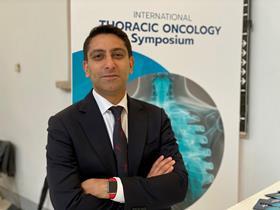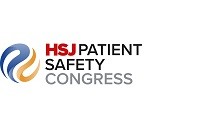What role can collaborative partnerships play in driving innovation into patient pathways to improve outcomes?
This article has been developed and funded by AstraZeneca. Pathfinder is a collaborative initiative between AZ, the NHS and other organisations, with AstraZeneca providing funding for this collaboration.
Lung cancer remains the UK’s number one cancer killer, responsible for 35,000 deaths every year, and is a major public health issue for the NHS in terms of healthcare costs and utilisation.[1],[2] Advanced technology has the potential to transform the way we work by optimising patient pathways to provide equitable and more timely access to diagnostics and treatment.
Sponsored by
Vicky Heaton and Dr Neal Navani discuss how industry partnerships can achieve faster diagnosis and treatment in lung cancer care and how a new lung cancer pathway optimisation initiative – PATHFINDER, has the potential to be a triple win for patients, healthcare professionals, and the NHS.
Q1: What is the scale of unmet need in lung cancer within the UK?
Dr Neal Navani: Lung cancer is the third most common cancer in the UK, with 48,500 new diagnoses each year.[1] It has one of the worst cancer survival rates - just one in 10 patients in England will live 10 years or more, following diagnosis. [1] This is largely attributed to diagnoses happening at later stages when treatment is less likely to be effective.[3] The economic burden is enormous, lung cancer costs the UK economy £2.4bn per year.[2] Recent data shows, that more than 60 per cent of lung cancer patients in England receive their diagnosis when lung cancer is at either stage three or four, well behind the NHS long-term plan’s ambition to diagnose 75 per cent of all cancer patients at stage one or two by 2028.[4][5] Cure rates can be as high as 80 per cent to 90 per cent for patients who are diagnosed when they have small, early stage lung cancer. [6]

Q2: Could you elaborate on the PATHFINDER initiative – what is it?

Vicky Heaton: PATHFINDER is a first-of-its-kind initiative by AstraZeneca to optimise lung cancer pathways to improve outcomes and supports the NHS to meet timelines set out in the National Optimal Lung Cancer Pathway. Crucially, PATHFINDER aims to diagnose patients earlier, accelerate navigation to treatment, and increase curative intent treatment rates.
Guided by top UK experts in lung cancer, PATHFINDER has partnered with specialists in pathway streamlining and advanced technologies. IQVIA has undertaken a deep-dive audit of six hospital sites across the UK to understand where pathway adaptations have succeeded or failed. Qure.ai, specialists in applying artificial intelligence solutions, and Clinithink, a pioneer in the data extraction from patient notes will help deploy solutions to process millions of detailed medical records in hours – a process that would take years if completed manually – to deliver valuable insights. These insights will help to develop predictive models to flag high-risk individuals at much earlier, more treatable, stages – when neither they nor their GP knows they have lung cancer or even suspects it.
Q3: Why is PATHFINDER particularly relevant for lung cancer care?
Dr Neal Navani: The grim reality of lung cancer outcomes, compounded by late-stage diagnoses in two-thirds of patients, has fuelled an urgency to address this major public health issue.[7] Harnessing and understanding unstructured medical data creates enormous opportunities to transform the patient pathway. We know that for every four weeks of delay in a cancer diagnosis, that this results in a 10 per cent increase in cancer deaths.[8]
Q4: How is PATHFINDER identifying issues within the lung cancer pathway?
Vicky Heaton: PATHFINDER employs digital tools to offer rapid assessments of NHS performance against national targets and address bottlenecks within the lung cancer pathway, by implementing best practice solutions. The PATHFINDER performance dashboard provides insights at a Cancer Alliance level, while a pathway questionnaire describes local pathways and monitors progress toward the National Optimal Lung Cancer Pathway.
Q5: What positive impact can PATHFINDER have on lung cancer care?
Vicky Heaton: The potential impact of PATHFINDER extends to patients, healthcare professionals, and the NHS. Patients could be diagnosed earlier resulting in them living longer and even being cured, whilst also benefitting from a more patient-centred experience. Healthcare professionals stand to gain by being able to optimise diagnosis and treatment strategies leading to improved outcomes for their patients. Meanwhile, the NHS could reap the rewards of streamlined services, improved outcomes, and reduced costs, as many more patients will be treated earlier potentially removing the need for hospitalisation. Collaborative partnerships exemplified by PATHFINDER, hold the promise of transforming cancer care in the UK, and the prospects for improved patient outcomes are increasingly encouraging.
To find out more about PATHFINDER, contact: neil.kenyon@astrazeneca.com
Job number: GB-48858
Date of preparation: October 2023
References
[1] Cancer Research UK. Lung Cancer Statistics. Available at: https://www.cancerresearchuk.org/health-professional/cancer-statistics/statistics-by-cancer-type/lung-cancer.Last accessed: October 2023.
[2] University of Oxford. Cancer costs the UK economy £15.8bn a year. Available at: https://www.ox.ac.uk/news/2012-11-07-cancer-costs-uk-economy-%C2%A3158bn-year. Last accessed: October 2023.
[3] Wilcock A., et al. Early Diagnosis Matters. UK Lung Cancer Coalition. 2020; 4-25. Available at: https://www.uklcc.org.uk/our-reports/january-2020/early-diagnosis-matters. Last accessed: October 2023.
[4] The Royal Marsden Cancer Charity. New artificial intelligence (AI) model could improve lung cancer early diagnosis. Available at: https://www.royalmarsden.org/blog/new-artificial-intelligence-ai-model-could-improve-lung-cancer-early-diagnosis. Last accessed: October 2023.
[5] NHS England. NHS Long Term Plan ambitions for cancer. Available at: https://www.england.nhs.uk/cancer/strategy/. Last accessed: October 2023.
[6] Cancer.Net. Just Diagnosed with Lung Cancer: Answers from an Expert. Available at: https://www.cancer.net/blog/2018-06/just-diagnosed-with-lung-cancer-answers-expert. Last accessed: October 2023.
[7] Cancer Research UK Barts Centre. Why we focus on lung cancer. Available at: https://www.bartscancer.london/our-research/lung-cancer/. Last accessed: October 2023.
[8] BMJ. Every month delayed in cancer treatment can raise risk of death by around 10 per cent. Available at: https://www.bmj.com/company/newsroom/every-month-delayed-in-cancer-treatment-can-raise-risk-of-death-by-around-10/. Last accessed: October 2023.


























